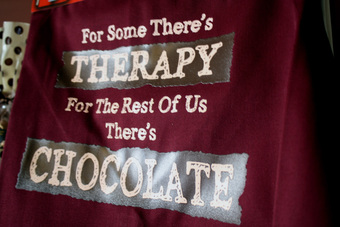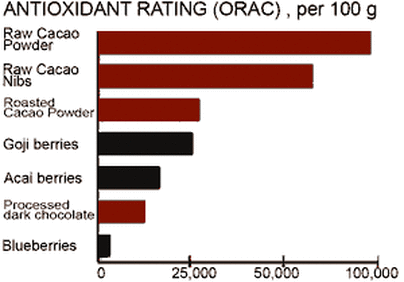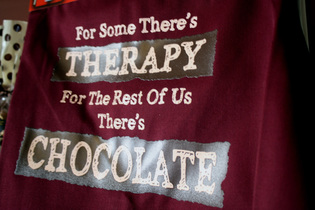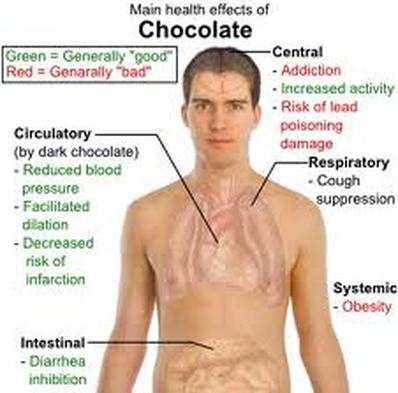Aug 2011

Eating chocolate could benefit the heart,a study finds, possibly lowering heart disease by 37%.
The results come from a meta-analysis released online Monday in the British Medical Journal. Researchers from the United Kingdom and Colombia focused on seven studies looking at the link between eating chocolate and a reduction in heart disease that included 114,009 people.
Of those seven, five showed an association between higher levels of chocolate consumption and a lowered risk of cardiometabolic illness.
The highest levels were linked with a 37% drop in cardiovascular disease and a 29% reduction in stroke, compared to the lowest levels.
There was no significant association seen between chocolate consumption and heart failure, and only one study drew a link between eating chocolate and a lowered risk of diabetes. None of the studies, including the meta-analysis, were funded by a chocolate company or a related industry.
The results come from a meta-analysis released online Monday in the British Medical Journal. Researchers from the United Kingdom and Colombia focused on seven studies looking at the link between eating chocolate and a reduction in heart disease that included 114,009 people.
Of those seven, five showed an association between higher levels of chocolate consumption and a lowered risk of cardiometabolic illness.
The highest levels were linked with a 37% drop in cardiovascular disease and a 29% reduction in stroke, compared to the lowest levels.
There was no significant association seen between chocolate consumption and heart failure, and only one study drew a link between eating chocolate and a lowered risk of diabetes. None of the studies, including the meta-analysis, were funded by a chocolate company or a related industry.
Heart Healthy Chocolate

Beware of increasing your caloric intake by eating too much chocolate.
Although the participants in the studies ate a variety of chocolate products, including chocolate bars, drinks, nutritional supplements and desserts, all chocolate is not created equal, and eating too much of the stuff that's filled with fat and sugar can put on pounds, possibly upping the risk of high blood pressure and diabetes -- the very stuff that can lead to cardiovascular problems.
The study authors noted that among the studies there was no obvious dose-response relationship between chocolate and the risk of cardiometabolic disorders, so for now, everything in moderation, as they say.
And although the studies reviewed did control for a number of factors, including age, body mass index, physical activity, smoking and aspects of diet, there still may be other factors at work causing the heart benefits.
If chocolate is the root of these heart-healthy advantages, it may be due to its polyphenol content, anti-oxidants that could improve endothelial function (which may affect the risk of stroke and heart attack) as well as have a positive effect on blood pressure and insulin resistance.
More studies are needed, the authors wrote, to go beyond just an association and determine causation. We guess that means scientists will need more study participants willing to eat chocolate. Anyone care to volunteer ?
Although the participants in the studies ate a variety of chocolate products, including chocolate bars, drinks, nutritional supplements and desserts, all chocolate is not created equal, and eating too much of the stuff that's filled with fat and sugar can put on pounds, possibly upping the risk of high blood pressure and diabetes -- the very stuff that can lead to cardiovascular problems.
The study authors noted that among the studies there was no obvious dose-response relationship between chocolate and the risk of cardiometabolic disorders, so for now, everything in moderation, as they say.
And although the studies reviewed did control for a number of factors, including age, body mass index, physical activity, smoking and aspects of diet, there still may be other factors at work causing the heart benefits.
If chocolate is the root of these heart-healthy advantages, it may be due to its polyphenol content, anti-oxidants that could improve endothelial function (which may affect the risk of stroke and heart attack) as well as have a positive effect on blood pressure and insulin resistance.
More studies are needed, the authors wrote, to go beyond just an association and determine causation. We guess that means scientists will need more study participants willing to eat chocolate. Anyone care to volunteer ?
Why Chocolate is healthy

*Antioxidants: RAW Cacao has more antioxidant flavonoids than any food tested so far, including blueberries, red wine, and black and green teas. In fact, it has up to four times the quantity of antioxidants found in green tea. Health benefits of these antioxidants include:
* Promote cardiovascular health – Help dilate bloods vessels, reduce blood clotting, improve circulation, help regulate heartbeat and blood pressure, lower LDL cholesterol, and reduce the risk of stroke and heart attacks.
* Protect from environmental and metabolic toxins – Help repair and resist damage caused by free radicals, and may reduce risk of certain cancers.
* Neurotransmitters: By increasing the levels of specific neurotransmitters in our brains, RAW cacao promotes positive outlook, facilitates rejuvenation and simply helps us feel good.
* Serotonin – Cacao raises the level of serotonin in the brain; thus acts as an anti-depressant, helps reduce PMS systems, and promotes a sense of well-being.
* Endorphins - Cacao stimulates the secretion of endorphins, producing a pleasurable sensation similar to the “runner’s high” a jogger feels after running several miles.
* Phenylethylamine - Found in chocolate, phenylethylamine is also created within the brain and released when we are in love. Acts as mild mood elevator and anti-depressant, and helps increase focus and alertness.
* Anandamide - Anandamide is known as the “bliss chemical” because it is released by the brain when we are feeling great. Cacao contains both N-acylethanolamines, believed to temporarily increase the levels of anandamide in the brain, and enzyme inhibitors that slow its breakdown. Promotes relaxation, and helps us feel good longer.
* Essential Minerals: RAW Cacao beans are rich in a number of essential minerals, including magnesium, sulfur, calcium, iron, zinc, copper, potassium and manganese. Don’t let yourself fool: processed (=roasted cacao may come in all types of qualities on the market, yes, the price will mostly tell you, but the mineral content is very low compared with RAW Cacao)
* Magnesium - RAW Cacao seems to be the #1 source of magnesium of any food. Magnesium balances brain chemistry, builds strong bones, and helps regulate heartbeat and blood pressure. Magnesium deficiency, present in 80% of Americans, is linked with PMT, hypertension, heart disease, diabetes and joint problems.
* Sulfur - RAW Cacao is high in the beauty mineral sulfur. Sulfur builds strong nails and hair, promotes beautiful skin, detoxifies the liver, and supports healthy pancreas functioning.
Essential fats: There is a misperception that chocolate is fattening. In truth, the fats in cocoa butter are healthy fats. Cacao contains oleic acid, a heart-healthy monounsaturated fat, also found in olive oil, that may raise good cholesterol. Also, substances found in cacao are known to help reduce appetite.
Important note- To fully benefit from chocolate’s wide array of nutrients, eat chocolate that is as close to its natural state as possible. Whole cacao beans and nibs are best. You lose many of the health benefits when you eat commercially produced chocolate.
* Promote cardiovascular health – Help dilate bloods vessels, reduce blood clotting, improve circulation, help regulate heartbeat and blood pressure, lower LDL cholesterol, and reduce the risk of stroke and heart attacks.
* Protect from environmental and metabolic toxins – Help repair and resist damage caused by free radicals, and may reduce risk of certain cancers.
* Neurotransmitters: By increasing the levels of specific neurotransmitters in our brains, RAW cacao promotes positive outlook, facilitates rejuvenation and simply helps us feel good.
* Serotonin – Cacao raises the level of serotonin in the brain; thus acts as an anti-depressant, helps reduce PMS systems, and promotes a sense of well-being.
* Endorphins - Cacao stimulates the secretion of endorphins, producing a pleasurable sensation similar to the “runner’s high” a jogger feels after running several miles.
* Phenylethylamine - Found in chocolate, phenylethylamine is also created within the brain and released when we are in love. Acts as mild mood elevator and anti-depressant, and helps increase focus and alertness.
* Anandamide - Anandamide is known as the “bliss chemical” because it is released by the brain when we are feeling great. Cacao contains both N-acylethanolamines, believed to temporarily increase the levels of anandamide in the brain, and enzyme inhibitors that slow its breakdown. Promotes relaxation, and helps us feel good longer.
* Essential Minerals: RAW Cacao beans are rich in a number of essential minerals, including magnesium, sulfur, calcium, iron, zinc, copper, potassium and manganese. Don’t let yourself fool: processed (=roasted cacao may come in all types of qualities on the market, yes, the price will mostly tell you, but the mineral content is very low compared with RAW Cacao)
* Magnesium - RAW Cacao seems to be the #1 source of magnesium of any food. Magnesium balances brain chemistry, builds strong bones, and helps regulate heartbeat and blood pressure. Magnesium deficiency, present in 80% of Americans, is linked with PMT, hypertension, heart disease, diabetes and joint problems.
* Sulfur - RAW Cacao is high in the beauty mineral sulfur. Sulfur builds strong nails and hair, promotes beautiful skin, detoxifies the liver, and supports healthy pancreas functioning.
Essential fats: There is a misperception that chocolate is fattening. In truth, the fats in cocoa butter are healthy fats. Cacao contains oleic acid, a heart-healthy monounsaturated fat, also found in olive oil, that may raise good cholesterol. Also, substances found in cacao are known to help reduce appetite.
Important note- To fully benefit from chocolate’s wide array of nutrients, eat chocolate that is as close to its natural state as possible. Whole cacao beans and nibs are best. You lose many of the health benefits when you eat commercially produced chocolate.
Dark Chocolate good for blood pressure and cholesterol

June 4, 2012 — The blood pressure–lowering and lipid effects of dark chocolate could be an effective — and money-saving — strategy for preventing cardiovascular events in high-risk patients, a new study suggests.
"The findings of this study suggest that the blood pressure lowering and lipid effects of plain dark chocolate could represent an effective and cost effective strategy for the prevention of cardiovascular disease in people with metabolic syndrome (and no diabetes)," the researchers, with senior author Christopher M. Reid, PhD, CCRE Therapeutics, Department of Epidemiology and Preventive Medicine, Monash University, The Alfred Centre, Melbourne, Victoria, Australia, conclude.
"Chocolate benefits from being by and large a pleasant and, hence sustainable, treatment option," they write. "Evidence to date suggests that the chocolate would need to be dark and of at least 60-70% cocoa, or formulated to be enriched with polyphenols."
Dark chocolate, derived from coca beans, is rich in polyphenols, specifically flavonoids that exhibit antihypertensive, anti-inflammatory, antithrombotic, and metabolic effects, all of which may contribute to cardio-protection.
The study was published online May 31 in the BMJ.
The estimated incremental cost-effectiveness ratio was $52,500 per years of life saved when $42 per person per year was assumed to have been spent on a prevention strategy using dark chocolate.
Even if only 80% of individuals with metabolic syndrome adhered to daily consumption of dark chocolate over 10 years, preventing only 55 nonfatal and 10 fatal events per 10,000, it would still be considered an effective and cost-effective intervention strategy, the authors write.
Prevention Strategy
A dark chocolate prevention strategy of $42 per person per year in a high-risk population would be cost-effective "based on the commonly accepted, albeit arbitrary, threshold of $50,000 per years of life saved," said the authors.
The $42 per person per year could be devoted to advertising, education campaigns, or, potentially, subsidization of dark chocolate in this high-risk population, they said.
The authors point out that they did not assess the potential effectiveness of dark chocolate consumption on cardiovascular events other than nonfatal stroke and nonfatal myocardial infarction, such as heart failure.
They also stressed that the effects of dark chocolate consumption on blood pressure and total cholesterol, although beneficial, are not as profound as those of drug interventions.
The authors have disclosed no relevant financial relationships.
BMJ. Published online May 31, 2012. Abstract
"The findings of this study suggest that the blood pressure lowering and lipid effects of plain dark chocolate could represent an effective and cost effective strategy for the prevention of cardiovascular disease in people with metabolic syndrome (and no diabetes)," the researchers, with senior author Christopher M. Reid, PhD, CCRE Therapeutics, Department of Epidemiology and Preventive Medicine, Monash University, The Alfred Centre, Melbourne, Victoria, Australia, conclude.
"Chocolate benefits from being by and large a pleasant and, hence sustainable, treatment option," they write. "Evidence to date suggests that the chocolate would need to be dark and of at least 60-70% cocoa, or formulated to be enriched with polyphenols."
Dark chocolate, derived from coca beans, is rich in polyphenols, specifically flavonoids that exhibit antihypertensive, anti-inflammatory, antithrombotic, and metabolic effects, all of which may contribute to cardio-protection.
The study was published online May 31 in the BMJ.
The estimated incremental cost-effectiveness ratio was $52,500 per years of life saved when $42 per person per year was assumed to have been spent on a prevention strategy using dark chocolate.
Even if only 80% of individuals with metabolic syndrome adhered to daily consumption of dark chocolate over 10 years, preventing only 55 nonfatal and 10 fatal events per 10,000, it would still be considered an effective and cost-effective intervention strategy, the authors write.
Prevention Strategy
A dark chocolate prevention strategy of $42 per person per year in a high-risk population would be cost-effective "based on the commonly accepted, albeit arbitrary, threshold of $50,000 per years of life saved," said the authors.
The $42 per person per year could be devoted to advertising, education campaigns, or, potentially, subsidization of dark chocolate in this high-risk population, they said.
The authors point out that they did not assess the potential effectiveness of dark chocolate consumption on cardiovascular events other than nonfatal stroke and nonfatal myocardial infarction, such as heart failure.
They also stressed that the effects of dark chocolate consumption on blood pressure and total cholesterol, although beneficial, are not as profound as those of drug interventions.
The authors have disclosed no relevant financial relationships.
BMJ. Published online May 31, 2012. Abstract
Long-Term Effects

Previous studies have shown that dark chocolate consumption may lower blood pressure, but they have been relatively short, only up to a maximum of 18 weeks. Studies have also shown that dark chocolate may decrease total and low-density lipoprotein cholesterol and increase high-density lipoprotein cholesterol, but again, these changes have been explored only in short-term trials.
To determine potential long-term effects of consuming dark chocolate every day, as well as the cost-effectiveness of this strategy, Australian researchers used statistical modeling techniques, particularly a Markov model to which health states ("alive without cardiovascular disease," "alive with cardiovascular disease," "dead from cardiovascular disease," "dead from other causes") and decision analysis (no dark chocolate [control], or with dark chocolate [treatment]) were added.
With each annual cycle, the researchers used risk prediction algorithms and population life tables to estimate how eating dark chocolate every day for 10 years would affect patients with metabolic syndrome.
The study used data on 2013 participants from the Australian Diabetes Obesity and Lifestyles study who had metabolic syndrome, did not have a diagnosis of cardiovascular disease or frank diabetes, and who were not receiving antihypertensive medications.
The patients were relatively young (mean age, 53.6 years) and considered at high risk: They had a mean systolic blood pressure of 141.1 mmHg, mean total cholesterol level of 6.1 mmol/L, mean hemoglobin A1c of 34.4 mmol/mol, and mean waist circumference of 100.4 cm.
The researchers concluded that under the best-case scenario, in which all these patients ate dark chocolate daily for a decade, 70 nonfatal cardiovascular events, including nonfatal stroke and nonfatal myocardial infarction per 10,000 population, as well as 15 cardiovascular related deaths per 10,000 population, could be prevented.



